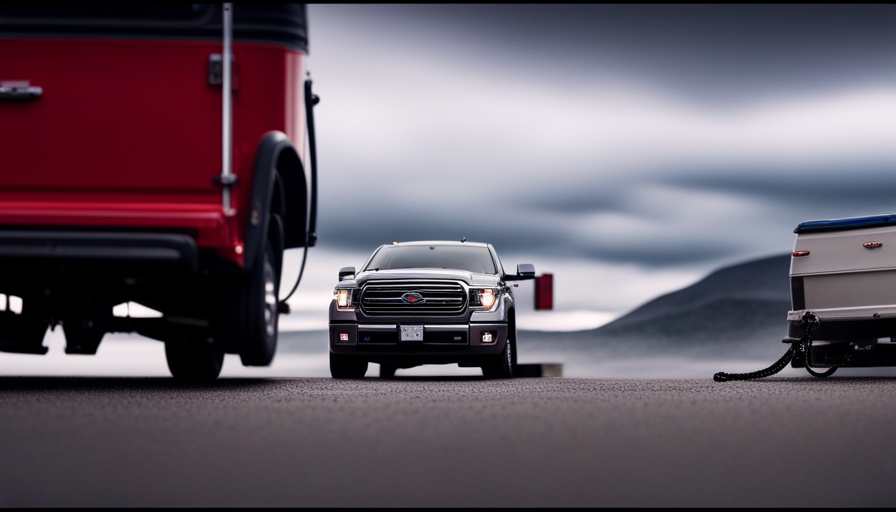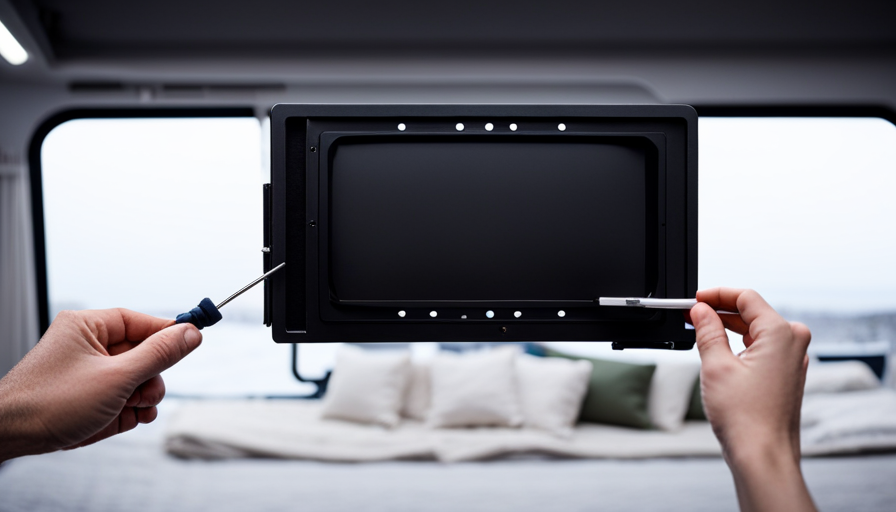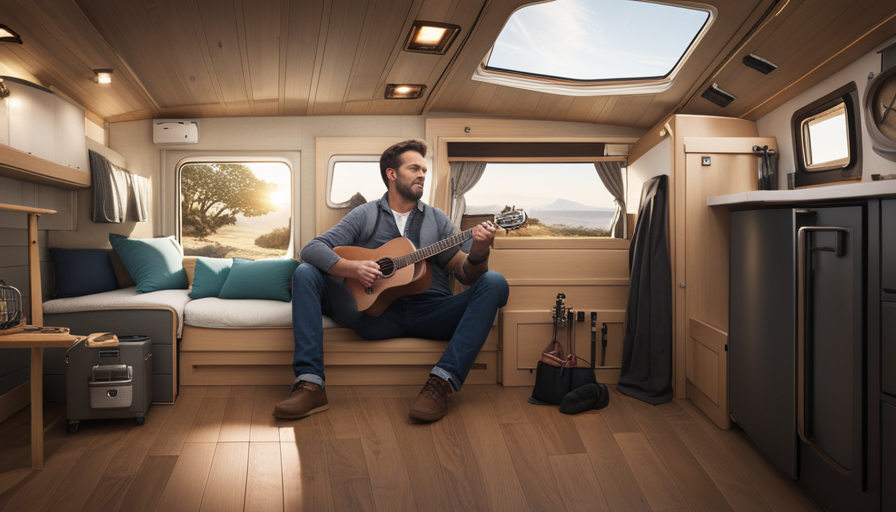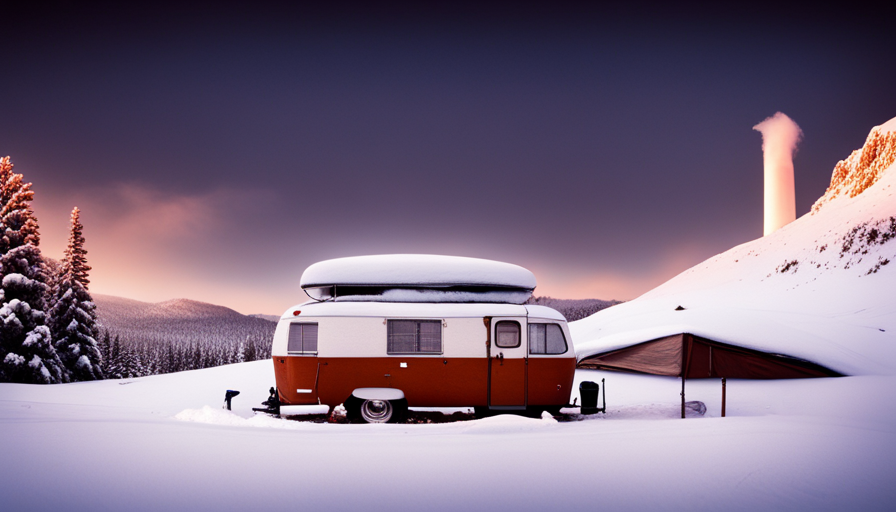Did you know that more than 40 million Americans go on camping trips each year? If you are one of them, you might be considering towing a camper for your next adventure. But before you hit the road, it is important to know the guidelines for safely and efficiently towing a camper.
In this article, we will guide you through the essential requirements and steps to ensure a smooth towing experience. From choosing the right vehicle and understanding weight limits to investing in a reliable trailer hitch and practicing safe driving techniques, we’ve got you covered.
We will also discuss important topics such as electrical and lighting requirements, planning your route and stops, and staying up-to-date with towing laws and regulations. By following these expert tips, you’ll be well-prepared to embark on your next camping trip with confidence and peace of mind.
So, let’s dive in and get ready to hit the road!
Key Takeaways
- Choose a vehicle with the appropriate towing capacity and Gross Vehicle Weight Rating (GVWR) for safe towing.
- Ensure that your trailer hitch and towing package match the weight capacity of your camper.
- Familiarize yourself with weight limits and regulations set by your state or country to avoid straining your vehicle.
- Invest in a reliable trailer hitch that is the right class and hitch receiver size, and made of quality and durable materials.
Choose the Right Vehicle for Towing
To tow a camper, you’ll need to find the perfect vehicle that can handle the weight and make your road trip dreams come true. Choosing the right vehicle for towing is crucial to ensure a safe and enjoyable journey. When selecting a vehicle, it’s important to understand weight limits and regulations.
First, consider the towing capacity of the vehicle. This refers to the maximum weight that the vehicle can safely tow. It is essential to match the weight of your camper with a vehicle that can handle it. Exceeding the towing capacity can put strain on the engine, brakes, and suspension, compromising safety.
Additionally, pay attention to the Gross Vehicle Weight Rating (GVWR). This is the maximum weight that a vehicle can carry, including passengers, cargo, and the camper itself. Understanding the GVWR will help you determine if the vehicle can accommodate the weight of your camper and everything else you plan to bring along.
Moreover, consider the trailer hitch and towing package. Ensure that the vehicle is equipped with a suitable hitch that matches the weight capacity of your camper. A towing package may include features like a transmission cooler and heavy-duty suspension, providing added stability and control while towing.
Understanding weight limits and regulations is crucial when choosing the right vehicle for towing. By taking these factors into account, you can find a vehicle that meets your needs and ensures a safe and enjoyable towing experience.
Now, let’s explore how to understand weight limits and regulations in more detail.
Understand Weight Limits and Regulations
Understanding weight limits and regulations is crucial when planning to haul a recreational vehicle. The weight distribution of your camper plays a major role in determining the towing capacity needed for your vehicle. It is important to know the weight of your camper and ensure that it falls within the towing capacity of your chosen vehicle.
Exceeding the towing capacity can put excessive strain on your vehicle’s engine, transmission, and brakes, leading to potential safety hazards and damage. Additionally, it is essential to familiarize yourself with the weight limits and regulations set by your state or country.
These regulations may specify requirements for trailer brakes, safety chains, and additional mirrors, among other things. Ignoring these regulations can result in fines or even accidents. To avoid these issues, it is crucial to understand towing capacity and weight distribution, ensuring that your camper is within the limits set by your vehicle and regulations.
Once you have a good understanding of these factors, you can confidently invest in a reliable trailer hitch.
Invest in a Reliable Trailer Hitch
Investing in a reliable trailer hitch is like having a superhero sidekick for your towing adventures, providing unparalleled strength and security.
When it comes to trailer hitch installation, it’s crucial to choose a hitch that matches the towing capacity of your vehicle. The hitch weight capacity is a key factor to consider, as it determines the maximum weight your hitch can handle.
Here are three important things to keep in mind when investing in a trailer hitch:
-
Choose the right class: Trailer hitches come in different classes, ranging from Class I to Class V, each with varying weight capacities. It’s essential to select the appropriate class that suits your towing needs.
-
Consider the hitch receiver size: Trailer hitches have different receiver sizes, such as 1-1/4 inches, 2 inches, or 2-1/2 inches. Make sure the hitch receiver size matches the hitch accessories you plan to use.
-
Look for quality and durability: Opt for a trailer hitch made from high-quality materials, such as steel, to ensure durability and long-lasting performance.
By investing in a reliable trailer hitch and considering these factors, you can tow your camper with confidence and peace of mind. However, it’s also crucial to use proper safety equipment to ensure a safe towing experience.
Use Proper Safety Equipment
Make sure you buckle up and secure your safety gear before embarking on your towing adventure. When it comes to towing a camper, safety should always be your top priority. Understanding towing capacity and proper weight distribution are essential for a smooth and safe journey.
Firstly, it’s crucial to know your vehicle’s towing capacity. Exceeding this limit can put unnecessary strain on your vehicle’s engine and transmission, leading to potential damage. Additionally, ensure that the weight of your camper is evenly distributed across the trailer. Uneven weight distribution can cause swaying or fishtailing, making it difficult to control your vehicle.
To ensure proper weight distribution, invest in a weight distribution hitch. This device helps distribute the weight of the camper evenly across the entire towing setup, improving stability and control. It also helps prevent the rear of your vehicle from sagging, which can impact steering and braking performance.
Another important safety measure is to equip your vehicle and camper with the necessary lighting and electrical connections. Before setting off, check that your vehicle’s electrical system is compatible with your camper’s lighting requirements. This includes ensuring that all brake lights, turn signals, and taillights are functioning properly.
By following these safety guidelines and using the proper equipment, you’ll greatly reduce the risk of accidents or mishaps while towing your camper. Now, let’s explore the next crucial step: knowing the camper’s electrical and lighting requirements.
Know the Camper’s Electrical and Lighting Requirements
To ensure a safe and enjoyable towing experience, it’s important for you to familiarize yourself with the electrical and lighting requirements of your camper. Understanding the camper’s power source and electrical hookups is crucial for a successful trip.
Firstly, make sure you have a reliable power source for your camper. Most campers require a 12-volt battery to power their electrical systems, including lights, appliances, and water pumps. It’s essential to check the battery’s condition before each trip and ensure it’s fully charged. Additionally, consider investing in a backup battery or a generator for emergencies.
Next, familiarize yourself with the camper’s electrical hookups. Most campers have a standard seven-way connector that allows you to connect the camper’s electrical system to your vehicle. This connector provides power for the lights, brakes, and other electrical components of the camper. Ensure that the connector is properly attached and functioning before hitting the road.
Remember to check the camper’s lighting requirements as well. Make sure all the exterior lights, including brake lights, turn signals, and taillights, are working correctly. It’s also essential to carry spare bulbs and fuses in case of any issues along the way.
By understanding the camper’s power source and electrical hookups, you can ensure a smooth and hassle-free towing experience. Now that you’re well-equipped with this knowledge, let’s move on to the next section about packing and securing your belongings properly.
Pack and Secure Your Belongings Properly
Once you’ve familiarized yourself with the electrical and lighting requirements of your camper, it’s essential to pack and secure your belongings properly. This step is crucial to ensure a safe and smooth towing experience.
Proper packing ensures that your belongings are organized and won’t shift during transit, minimizing the risk of damage or accidents. Start by making a checklist of all the items you need to bring, making sure you have everything you need for your camping trip.
Pack heavier items first, placing them low and towards the front of the camper to maintain stability. Distribute the weight evenly to avoid putting too much strain on your towing vehicle. Secure loose items with bungee cords or straps to prevent them from shifting while on the road.
When loading your camper, be mindful of weight limits and evenly distribute the load between the front and rear sides. Check that all cabinets, drawers, and doors are securely closed to prevent items from falling out and causing a distraction or hazard while driving.
Properly securing your belongings not only ensures a safer journey but also helps maintain the balance and stability of your camper. With everything packed and secured, you can now transition into practicing safe driving techniques, which we’ll cover in the next section.
Practice Safe Driving Techniques
When towing a camper, it’s essential to practice safe driving techniques to ensure a smooth and secure journey.
Firstly, it’s crucial to allow for extra braking distance, as the added weight of the camper will increase the stopping distance.
Secondly, maintaining a safe and steady speed is vital to prevent any sudden movements or swaying of the camper.
Lastly, being mindful of turns, curves, and inclines is important to navigate these road features smoothly and safely.
By following these key points, we can ensure a safe and enjoyable towing experience.
Allow for extra braking distance
Brace yourself for the immense braking power you’ll need when towing a camper, because it’s like stopping a freight train! When you’re hauling a heavy load, such as a camper, it’s crucial to allow for extra braking distance. Your braking techniques will play a significant role in ensuring a safe towing experience.
As experienced campers, we know the importance of being knowledgeable about the braking capabilities of our vehicles and adjusting our driving accordingly. When towing, it’s essential to start braking earlier than you would in a regular car and apply steady pressure to gradually slow down. This allows the extra weight and momentum of the camper to be distributed evenly and prevents any sudden jerks or skidding.
By allowing for extra braking distance and mastering the appropriate techniques, you can confidently control your camper’s speed and ensure the safety of yourself and others on the road. Now, let’s delve into maintaining a safe and steady speed without compromising control.
Maintain a safe and steady speed
To ensure a smooth and enjoyable towing experience, it’s important for us to maintain a safe and steady speed while on the road with our camper. Here are some safe driving techniques to keep in mind:
-
Maintain a consistent speed: Avoid sudden accelerations or decelerations, as they can cause instability and sway.
-
Use cruise control wisely: While it can help maintain a steady speed, be cautious when using it on hilly or winding roads.
-
Keep a safe following distance: Leave more space between your vehicle and the one ahead to allow for extra braking distance.
-
Monitor your speed on downhill slopes: Use engine braking and downshift gears to control your speed and prevent the camper from gaining too much momentum.
By following these safe driving techniques and allowing for extra braking distance, you can ensure a safer towing experience. Now, let’s discuss how to be mindful of turns, curves, and inclines without compromising stability.
Be mindful of turns, curves, and inclines
Navigating turns, curves, and inclines requires our full attention and careful maneuvering. When towing a camper, it’s crucial to maintain safe driving techniques to ensure a smooth and secure journey.
Firstly, it’s important to approach turns and curves at a controlled speed, keeping in mind the added weight and length of the camper. Slow down before the turn, and maintain a steady speed throughout to avoid swaying or fishtailing.
Additionally, be cautious when going uphill or downhill, as inclines can affect the stability of the camper. Use proper braking techniques, such as applying the brakes gently and evenly to avoid jerking or skidding.
Remember, safety should always be the top priority when towing a camper. By mastering these techniques, you can confidently navigate turns, curves, and inclines.
Now, let’s move on to the next section and discuss how to plan your route and stops effectively.
Plan Your Route and Stops
When planning your route and stops for towing a camper, it’s important to research and choose campgrounds that offer suitable amenities for your needs. Look for campgrounds with spacious sites, clean facilities, and possibly even hookups for electricity and water.
Additionally, consider the availability of fuel stations and rest areas along your route to ensure you can easily refuel and take breaks when needed.
Lastly, plan for breaks and rest periods during long drives to prevent fatigue and maintain alertness on the road. Take advantage of scenic rest stops or designated pull-off areas to stretch your legs and recharge before continuing your journey.
Research and choose campgrounds with suitable amenities
Finding the perfect campground with all the amenities you need for a comfortable and enjoyable camping trip can be a thrilling adventure. When researching campgrounds, it’s important to consider the amenities they offer.
Start by making a list of amenities that are essential for your trip, such as electricity hookups, water supply, and clean restrooms. Additionally, think about any additional amenities that would enhance your experience, such as swimming pools, playgrounds, or hiking trails.
Read reviews and check campground websites to gather information about the amenities they provide. Look for campgrounds that have a good selection of amenities that meet your needs and preferences.
Once you have a few options in mind, consider the availability of fuel stations and rest areas nearby for convenience during your journey. This will ensure a smooth transition into the next section about planning your stops.
Consider the availability of fuel stations and rest areas
Make sure to keep an eye out for fuel stations and rest areas along your route to ensure a smooth and convenient journey. When towing a camper, it’s crucial to consider the availability of fuel to avoid any unexpected delays. Plan your route in advance and identify fuel stations along the way, ensuring that they can accommodate your camper’s size and have easy access.
Additionally, rest areas are essential for taking breaks and stretching your legs during long drives. Look for rest areas that offer facilities such as clean restrooms, picnic tables, and even playgrounds for children. These rest areas provide a much-needed break from driving and allow you to recharge before hitting the road again.
By considering the availability of fuel stations and rest areas, you can plan for breaks and rest periods during long drives without compromising your journey’s comfort and safety.
Plan for breaks and rest periods during long drives
To ensure a comfortable and enjoyable journey, it’s essential for you to plan regular breaks and rest periods during those long drives. Taking breaks not only allows you to stretch your legs and refresh your mind, but it also helps prevent fatigue and promotes safer driving.
Here are some road trip tips to make the most of your breaks:
-
Explore nearby attractions: Use your breaks to visit interesting landmarks, scenic viewpoints, or local attractions. It adds a sense of adventure to your journey and breaks up the monotony of long drives.
-
Enjoy a picnic: Pack some snacks or a light meal and find a scenic spot to have a picnic during your break. It’s a great opportunity to relax, soak in the surroundings, and refuel both physically and mentally.
Remember, breaks and rest periods are crucial for a successful road trip.
Now, let’s talk about performing regular maintenance on your vehicle and camper to ensure a smooth journey.
Perform Regular Maintenance on Your Vehicle and Camper
Before each trip, we always make sure to check the tire pressure and condition of both our vehicle and our camper. It’s crucial to have properly inflated tires for a safe and smooth journey.
Additionally, we inspect and maintain the brakes and suspension of our camper to ensure they’re in good working order.
Lastly, we service our vehicle’s engine and transmission as recommended to keep them running efficiently and avoid any potential breakdowns on the road.
Regular maintenance is key to a successful and worry-free camping adventure.
Check tire pressure and condition before each trip
Ensuring your camper’s tires are properly inflated and in good condition is crucial for a safe and smooth journey. Regular tire pressure maintenance and tire condition inspection are essential tasks that should be performed before each trip.
Start by checking the recommended tire pressure in your camper’s manual and use a reliable tire pressure gauge to measure the pressure accurately. Inflate or deflate the tires accordingly to match the recommended pressure.
Additionally, inspect the tire condition for any signs of wear, such as cracks, bulges, or uneven tread wear. If you notice any issues, it’s important to replace the tires before hitting the road.
By taking the time to check tire pressure and condition, you can prevent accidents and ensure optimal performance while towing your camper.
Moving on to the next section about inspecting and maintaining the camper’s brakes and suspension, it’s important to have them in top condition to ensure a safe and comfortable ride.
Inspect and maintain the camper’s brakes and suspension
Before each trip, it’s crucial to check the tire pressure and condition of your camper. This ensures a safe and smooth journey. However, tire maintenance is just one aspect of towing a camper.
Another important component to consider is the camper’s brakes and suspension. Inspecting the suspension will help identify any issues with the shock absorbers, springs, or other components that could affect the stability and handling of the camper. Additionally, checking the trailer brakes is essential for maintaining control and stopping power while on the road.
To properly inspect the suspension and brakes, there are a few key steps to follow:
- Examine the suspension components for signs of wear or damage.
- Check the brake pads and rotors for wear and tear.
- Test the functionality of the brake system by engaging and releasing the brakes.
- Ensure that the brake fluid levels are adequate.
By thoroughly inspecting the suspension and checking the trailer brakes, you can ensure the safety and reliability of your camper while towing.
Now, let’s move on to the next important topic: servicing the vehicle’s engine and transmission as recommended.
Service the vehicle’s engine and transmission as recommended
To maintain optimal performance and prevent potential issues, make sure you regularly service your vehicle’s engine and transmission according to the manufacturer’s recommendations. Engine maintenance is crucial for towing a camper, as the added weight puts extra strain on the engine. Regular oil changes, air filter replacements, and spark plug inspections are essential to keep the engine running smoothly.
Additionally, checking the cooling system and ensuring proper fluid levels is important to prevent overheating.
Transmission service is equally important when it comes to towing a camper. The transmission is responsible for transferring power from the engine to the wheels, and the increased load can cause it to work harder. Regular transmission fluid changes and inspections help prevent damage and maintain proper function.
By properly servicing your vehicle’s engine and transmission, you can ensure reliable performance while towing a camper. Now, let’s transition into the next section and familiarize ourselves with towing laws and regulations.
Familiarize Yourself with Towing Laws and Regulations
Get ready to hit the road with your camper by making sure you’re well-versed in the rules of the towing game, like understanding the highway as the stage and the towing laws as the script.
When it comes to towing a camper, there are certain laws and regulations that you need to be familiar with in order to ensure a safe and legal journey.
One important aspect to consider is the towing license requirements. Depending on the weight and size of your camper, you may need a specific type of license to tow it. It’s crucial to check the requirements in your state or country and obtain the necessary license before embarking on your trip. This will not only keep you on the right side of the law but also ensure that you have the skills and knowledge needed to handle the camper safely.
Another key factor to understand is towing capacity. Every vehicle has a maximum weight it can tow, known as its towing capacity. It’s essential to know the towing capacity of your vehicle and make sure that it exceeds the weight of your camper. Overloading your vehicle can lead to dangerous situations on the road, such as decreased braking ability and instability. Familiarize yourself with the manufacturer’s specifications and consult with professionals if needed to ensure that you’re within the safe limits.
By familiarizing yourself with towing laws and regulations, and understanding towing license requirements and towing capacity, you’ll be well-prepared to tow your camper safely and legally. Remember, knowledge is key when it comes to enjoying a smooth and worry-free journey with your camper.
Frequently Asked Questions
How can I determine the towing capacity of my vehicle?
To determine the towing capacity of your vehicle, you need to understand weight limits. Start by checking your vehicle’s owner’s manual, as it usually provides this information.
The towing capacity is the maximum weight your vehicle can safely tow. It’s crucial to consider factors like the Gross Vehicle Weight Rating (GVWR) and Gross Combination Weight Rating (GCWR). These figures will help you determine the appropriate camper size that your vehicle can handle.
Are there any specific safety measures I should take when towing a camper?
When it comes to towing a camper, there are certain safety measures that we must adhere to.
It is crucial to ensure that our towing vehicle is equipped with the necessary towing equipment, such as a hitch and trailer wiring.
Additionally, we should always check the camper’s weight and make sure it’s within the towing capacity of our vehicle.
It’s also important to properly distribute the weight and secure any loose items inside the camper to maintain stability while on the road.
Proper tire pressure and regular maintenance checks are also essential for a safe towing experience.
What type of brake controller do I need for towing a camper?
To tow a camper, you’ll need a brake controller that is compatible with your vehicle and meets the towing laws and regulations in your area. It’s important to choose a brake controller that can handle the weight of your camper and ensure that you’re within the trailer weight limits set by your vehicle’s manufacturer. This will help you maintain control and ensure the safety of both your vehicle and the camper while towing.
Can I tow a camper with a smaller vehicle?
Yes, it’s possible to tow a camper with a smaller vehicle, but there are some factors to consider. First, you need to check the towing capacity limits of your vehicle. Make sure it can handle the weight of the camper.
Additionally, you’ll need to ensure that your vehicle has trailer hitch compatibility. This means that it has the proper towing equipment installed to safely tow a camper. It’s important to consult your vehicle’s manual and possibly seek professional advice to ensure a safe and successful towing experience.
Are there any specific insurance requirements for towing a camper?
Insurance coverage and understanding towing regulations are crucial when it comes to towing a camper. While some people may think these requirements are a hassle, they’re in place to protect you and others on the road.
It’s important to check with your insurance provider to ensure you have the appropriate coverage for towing a camper. Additionally, familiarize yourself with local towing regulations to avoid any legal issues.
Safety and compliance should always be a top priority when towing a camper.
What Are the Essential Items Needed for Camping?
When planning a camping trip, having the right items for a camper is crucial. A sturdy tent offers shelter, while a sleeping bag ensures a good night’s sleep. Pack proper cooking equipment like a portable stove and utensils for meal preparation. Don’t forget a first aid kit, insect repellent, and a reliable flashlight for emergencies. Pro tip: Include camping chairs and a cooler to enhance your outdoor experience.
Conclusion
In conclusion, embarking on the journey of towing a camper requires careful planning and preparation.
Ensuring you have the right vehicle, understanding weight limits, and investing in reliable equipment are essential.
Safety should never be compromised, so make sure to use proper safety gear and adhere to towing laws and regulations.
Remember, towing a camper is not just about the destination, but the adventure that awaits. So buckle up, hit the road, and let the open highway be your canvas for unforgettable memories. Happy towing!










